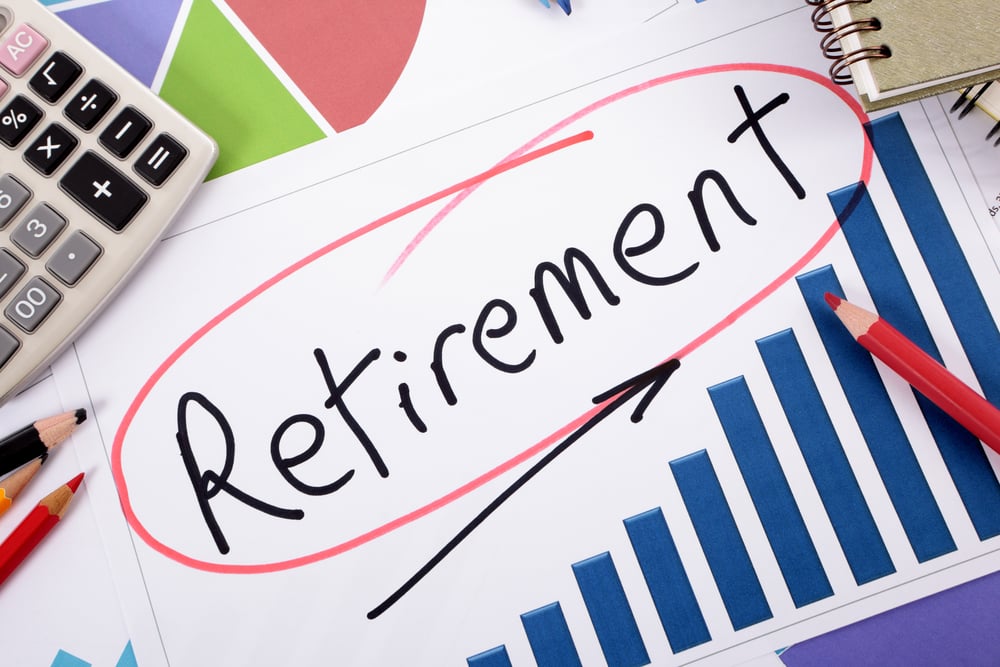
According to the Economic Policy Institute, Americans between the ages of 56 and 61 have an average of only $17,000 in retirement savings. This number is supported by the Life Insurance and Market Research Association (LIMRA) which estimates the average American household has just $17,500 in savings.
But a comfortable retirement is still one of the final chapters of the American dream. So what are Americans doing to make their retirement dreams a reality? The answer, for now, is the combination of Social Security along with traditional retirement plans and, in a declining number of cases, pension plans. This is good because LIMRA reports that approximately 4 out of 10 retired Americans have an annual income of less than $25,000.
A traditional retirement plan is becoming increasingly unrealistic
However, the reality of retirement is becoming more elusive for Americans under 40. For starters, traditional pension plans are going away. Just last week, General Electric NYSE: GE announced that they were freezing pension payments to over 20,000 salaried employees and offering buyouts to 100,000 former U.S. employees who have yet to withdraw from their pension.
This news was jarring because of GE’s reputation as one of America’s most venerable companies. However, the reality is that an increasing number of companies are reducing, or eliminating, pension benefits. The Department of Labor’s Employee Benefits Security Administration reports that the number of pension plans offering guaranteed payouts (i.e. defined benefits) dropped 73% between 1986 and 2016.
Personal Capital, a wealth management firm, recently completed a survey titled “Will Social Security Save Retirement?” Jay Shah, CEO made these comments regarding Americans saving for retirement. “Saving for retirement isn’t what it used to be. Strategies that set the standard twenty years ago, like Social Security and pensions are no longer safety nets for funding Americans’ retirement dreams.”
Plus Americans are not saving nearly enough for retirement
A recent article in Barron’s outlines a less comfortable reality. Many employees simply do not have adequate income to set aside money for retirement. And although wages are said to be increasing, the average American is still facing the reality of stagnant wages. And the less money that an employee earns, the less likely it is that they will be eligible to participate in a retirement plan of any kind. The news is particularly bad for millennials and Generation X. In fact, 39% of millennials and 34% of Generation X have no retirement savings.
“With the retirement landscape changing, it’s more important than ever for Americans to improve and act on their financial knowledge,” said Shah. “The technology available today, coupled with the insights and guidance of financial advisors, can dramatically improve retirement savings efforts.”
Your financial advisor may no longer be a fiduciary
The Department of Labor made a ruling that all financial advisors were required to be a fiduciary. This means that they have an obligation to ensure that they take no action that is not in the best interest of their client. However, an appeals court recently struck down that requirement. This means that now many investors have to be concerned about hidden fees and potential conflicts of interest. The good news for investors is that there is an abundance of free online tools that can help investors find tax-advantaged solutions for their retirement savings.
Social security will likely be different
The Social Security trustees’ 2018 annual report projects that the Social Security fund will be depleted by 2034. Look, politics is politics and nobody knows for sure what is going to happen to Social Security. But one thing is for certain, Americans are going to have to work longer to get the full benefit from their Social Security.
Still, the Personal Capital survey cites that one in four pre-retirees still expect Social Security to be their primary source of income in retirement. That includes 15% of millennials and 29% of Generation X. But the reality is that investors under the age of 50 need to plan as if Social Security will not be there.
Many Americans are rethinking retirement
For some Americans, the simple fact is they don’t want to fully retire. And while some of these workers are using a job to help them pay for leisure activities and traveling, there are many that need to work in order to cover their regular bills.
However they are approaching working in retirement, a 2017 survey from the RAND Corporation found that almost 40% of workers over 65 had previously retired at some point. In some cases, they are choosing to take place in the emerging “gig” economy which gives them flexible hours. Others are taking on roles as substitute teachers or providing consulting or freelance work.
Before you make your next trade, you'll want to hear this.
MarketBeat keeps track of Wall Street's top-rated and best performing research analysts and the stocks they recommend to their clients on a daily basis.
Our team has identified the five stocks that top analysts are quietly whispering to their clients to buy now before the broader market catches on... and none of the big name stocks were on the list.
They believe these five stocks are the five best companies for investors to buy now...
See The Five Stocks Here
Click the link below and we'll send you MarketBeat's list of seven stocks and why their long-term outlooks are very promising.
Get This Free Report